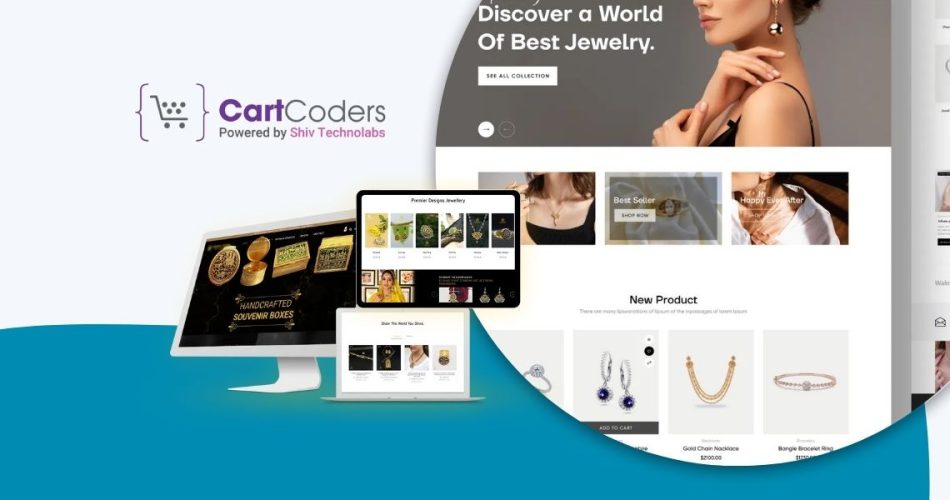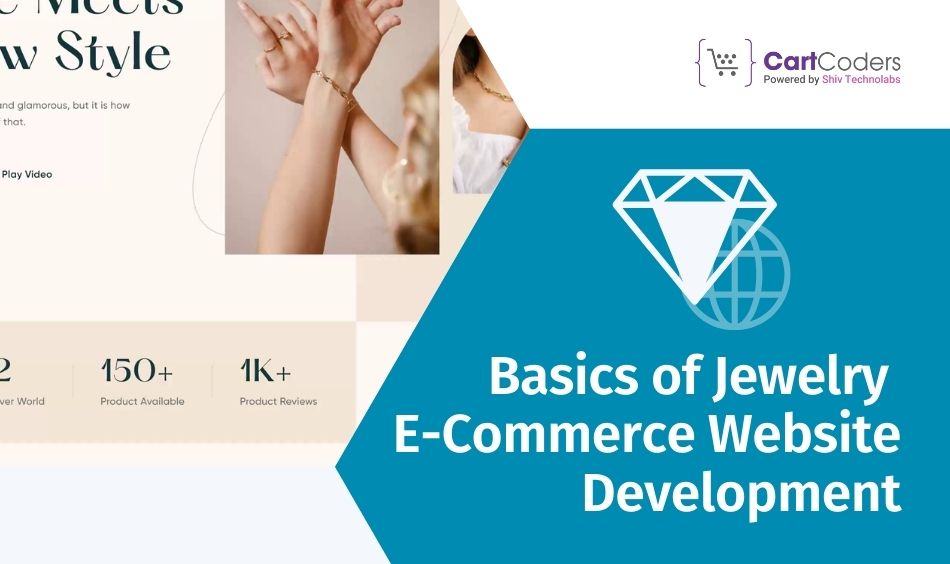Custom Engagement Solutions
Unlock tailored solutions with a free, no-obligation strategy session.
Expert Developers & Engineers on Demand
Scale Your Team with Skilled IT Professionals
Expert Guidance for Digital Transformation

Building an e-commerce website for jewelry in 2024 means entering an increasingly familiar digital shopping world, where millions of consumers prefer digital shopping convenience over physical. The global jewelry market is expected to reach USD 480 billion by 2025. However, developing a jewelry e-commerce website isn’t just about creating a basic online e-commerce store. It involves thoughtful design, user-friendly features and the latest security measures to build trust and drive sales.
This comprehensive guide will provide you with valuable insights into the top platforms for creating e-commerce websites tailored specifically for jewelry businesses. It will cover essential elements and features to consider, ensuring you make an informed decision for your online store.

E-commerce in jewelry sales has seen tremendous growth over time and online store development is now an indispensable element of remaining competitive in this space. Traditional sales relied heavily on physical stores; now consumers want the flexibility of browsing and purchasing jewelry online.
Jewelry e-commerce websites must stand out, attracting shoppers with attractive designs and useful features that draw their eye. A professional e-commerce site serves to increase brand visibility while driving profitability for any given business.
Choosing an ideal platform is key to building a thriving jewelry store online. Here are a few factors you should keep in mind to ensure that your online store reflects your brand and meets customer expectations.
1. Customization and Branding
Jewelry customers expect an engaging website, which captures their interest instantly. A customizable platform enables you to craft an e-storefront that reflects your brand through colours, typography, layout and interactive elements – perfect for high-end shoppers who demand premium browsing experiences! With advanced customization features at your disposal, you can build an elegant store that provides customers with a truly special shopping experience.
Customization also affects functionality. Platforms with flexible design options allow you to tailor navigation, product pages and checkout processes according to your brand, making your store both attractive and simple to use.
2. Product Showcase Capabilities
Jewelry is an expensive product and customers want a clear view before they decide to buy it. A platform offering high-resolution images, zoom functions, and 360-degree views allows customers to explore product details closely before making a decision. In addition, many platforms come equipped with immersive galleries which help showcase each product’s sparkle, texture, and craftsmanship effectively.
Product videos and detailed descriptions can help draw customers in. By offering realistic representations of each item, this feature enables customers to make confident purchasing decisions with certainty.
3. Inventory and Order Management
A robust inventory and order management system helps your business handle product variations such as ring sizes and chain lengths efficiently, while advanced inventory tools enable you to track stock levels and manage collections seamlessly. Look for platforms offering low-stock alerts as well as product bundling features that could benefit collections or related items.
These tools streamline daily operations and enable you to focus on customers rather than administrative duties. An effective order management system also ensures timely deliveries for maximum customer satisfaction and loyalty.
4. SEO and Marketing Tools
To stay competitive online, effective SEO and marketing features are crucial to increasing the visibility of your jewelry store. Platforms offering SEO-friendly URLs, customizable meta tags and marketing integrations help your jewelry store attract organic traffic; effective SEO tools improve search engine rankings so potential customers find their store easier when they look up specific jewelry items on search engines like Google.
Marketing tools also play a vital role. Look for platforms that support promotions, email marketing and social media sharing as these will enable you to run promotions, and sales or engage customers across channels thus driving traffic back into your store.
5. Security and Payment Options
Jewelry transactions often involve high-value purchases that require shoppers to trust that their payment information will remain safe. Platforms offering secure payment gateways, SSL certification, and fraud prevention measures provide customers with peace of mind.
Offering various payment options such as credit cards, digital wallets and buy-now-pay-later services enhances customer experience and helps increase conversions. These flexible solutions make transactions seamless while remaining safe – further increasing conversions.
6. Scalability and Growth Potential
As your jewelry business grows, so will its operational demands. A scalable e-commerce platform lets you expand your store, accommodating larger inventories, more traffic, and new features as needed. Choosing a scalable platform from the start ensures you can grow without facing limits or requiring costly platform migrations.
Scalable platforms handle seasonal spikes, sales events, and product line expansions, which is essential for jewelry brands aiming to reach a larger customer base.
We need to focus on key factors when developing a jewelry e-commerce website. Alternatively, you can customize your store with services from jewelry store design service providers like CartCoders.

There are numerous platforms available in the development market, but not all are equally suited for creating jewelry e-commerce websites. Let’s explore some of the best options for this specific purpose.
Shopify is one of the most widely used e-commerce platforms, known for its user-friendly interface and extensive app ecosystem.
Pros:
Ideal for: Shopify is the ideal platform for small to medium-sized jewelry businesses looking for quick setups with multiple customization options.

WooCommerce is an open-source solution that integrates seamlessly with WordPress, offering a high degree of customization.
Pros:
Cons:
Ideal for: Jewelers who seek an easily customizable, cost-effective platform will likely prefer WooCommerce over BigCommerce as an eCommerce solution.
BigCommerce’s robust features and scalability offer businesses advanced capabilities for online retail sales.
Pros:
Cons:
Ideal for: BigCommerce is designed for larger jewelry brands that prioritize growth and scalability over user friendliness
Wix offers user-friendly templates with drag-and-drop functionality to get any business off the ground quickly and cost-effectively.
Pros:
Cons:
Ideal for: Wix is a good fit for small jewelry businesses or startups looking for an affordable and straightforward option.
Magento is an open-source platform renowned for its customizability and its ability to meet complex business needs.
Pros:
Cons:
Ideal for: Magento is ideal for established jewelry brands with larger budgets and technical resources, including larger budgets for advertising campaigns
“Also Read: Jewellery Website Design and Development Cost: A Complete Guide”
Some factors to keep in mind before selecting the optimal platform for your jewelry business include:
Define Your Business Needs
Identify your target audience, product range and budget requirements before setting out on any business venture. Take into account anticipated traffic volumes, jewelry type offered for sale and the shopping experience desired – these all play into creating successful retail businesses.
Match Platform Features to Business Goals
Each platform provides various features, so select one that best meets the needs of your brand. For instance, WooCommerce might provide strong SEO capabilities while Shopify could be best suited for user-friendly design.
Test Platform Demos and Trial Periods
Most platforms provide demo or trial periods. Take this opportunity to evaluate their website speed, user experience and mobile compatibility to see if they meet your store’s specific needs.
With these considerations in mind, you can select a platform that not only meets your business requirements but also helps connect with customers and expand your jewelry brand.
Choosing the right platform is a vital step in developing e-commerce websites for jewelry businesses. Each option has unique strengths suited to different business sizes and goals, making it essential to select one that matches your vision for growth and a premium customer experience. To bring your jewelry store online with a platform perfectly tailored to your needs, consider working with a dedicated development team.
At CartCoders, we specialize in jewelry e-commerce website development, providing solutions that reflect your brand and engage your customers. With our expertise, you can build an online store that captivates buyers and supports your business’s growth in this competitive market. Start your journey with CartCoders to create a jewelry website that shines.
1. Which platform is best for a small jewelry business?
For small jewelry businesses, Shopify and Wix are excellent options. Shopify offers ease of use with extensive customization, while Wix provides a budget-friendly and straightforward setup with customizable templates, ideal for smaller stores with fewer technical needs.
2. What makes shopify a good option for jewelry businesses?
Shopify is a popular choice for jewelry businesses due to its user-friendly interface, customizable design options, and robust e-commerce features. It offers a variety of jewelry-specific templates and supports high-resolution images and videos, allowing for detailed product showcases. Additionally, Shopify provides secure payment gateways, efficient inventory management, and scalability to accommodate business growth. These features make it well-suited for jewelry retailers aiming to establish a strong online presence.
3. How does CartCoders support jewelry e-commerce website development?
CartCoders specializes in jewelry e-commerce website development, offering tailored solutions that reflect your brand’s identity and meet customer expectations. With CartCoders, you can create a user-friendly, secure, and captivating online store that supports business growth and customer engagement.
4. What should I consider when choosing between hosted and self-hosted platforms for my jewelry business?
Hosted platforms like Shopify manage all technical aspects, including hosting, security, and updates, making them easier to maintain. Self-hosted platforms like WooCommerce offer more control and flexibility but require technical expertise to set up and maintain. Consider your budget, technical skills, and desired level of customization when deciding between hosted and self-hosted options.
Projects delivered in 15+ industries.
95% retention rate, building lasting partnerships.
Serving clients across 25+ countries.
60+ pros | 10+ years of experience.